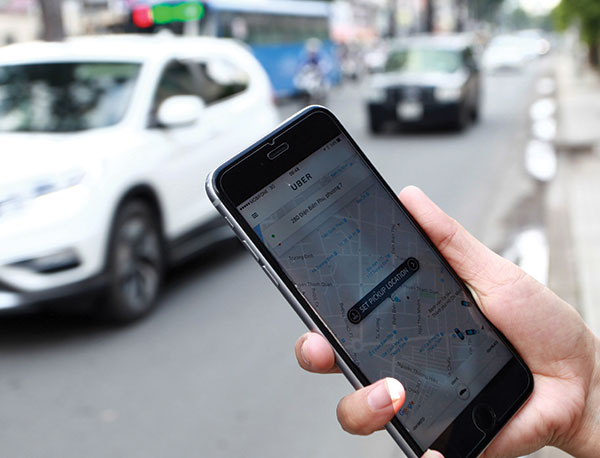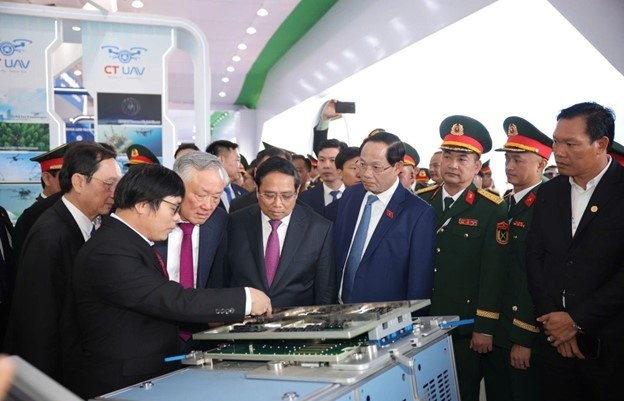Uber fails to meet legal standards to rideshare
 |
| MoT has denied Uber Vietnam’s proposal to join a rideshare trial programme that would ensure its legality Photo: Le Toan |
“Uber Vietnam’s development of the trial scheme and proposing the ministry’s approval under authorisation of Uber BV is not enough of a guarantee to tie down Uber BV’s responsibility for implementation of the scheme,” the Ministry of Transport (MoT) said in its Document No.634/BGTVT-VT recently sent to Uber Vietnam.
MoT received the firm’s proposal for this trial scheme in late 2016. The scheme is about applying information technology to support the management and connection of commercial passenger transportation by contract.
“The business lines of Uber Vietnam registered in its business licence cover management consulting, as well as market research and public opinion polls which are not related to the authorised activity,” the document explained.
If Uber Vietnam is authorised to build, propose, and implement the trial scheme, this firm needs to add the business line to its business licence, while directly building, signing, and taking responsibility for business contracts with transportation units, and contracts supplying connection services with passengers in Vietnam, according to the MoT document.
Regarding the contents of the e-contract application, MoT also asked Uber Vietnam to supplement to the trial scheme the detailed description and analysis of contents and process of its transportation contracts.
The contents of the e-contracts must abide by Decree No.86/2014/ND-CP, dated September 2014, covering business conditions for automobile transportation business, and MoT’s Circular No.63/2014/TT-BGTVT on management of automobile transportation and road transportation facilitation services.
In terms of protection of customers’ rights, the trial scheme does not clarify the rights and responsibilities of sci-tech service providers and transportation businesses for customers’ rights, nor does it include co-ordination regulations to deal with customers’ complaints.
According to reports by Hanoi and Ho Chi Minh City departments of Transport, many individual cars used Uber software to run passenger transportation business without a licence. Thus, MoT has asked Uber Vietnam not to co-operate with individual car owners to operate such an unlawful business until it completes all the contents of the trial scheme in line with local rules.
In January 2016, MoT started applying information technology to support the management and connection of commercial passenger transportation by contract (known as GrabCar), over a two-year trial period.
The GrabCar project was submitted to MoT in August 2015 by GrabTaxi Co., Ltd., and the government approved the pilot project submitted by the ministry a few months later. Under the project, five cities and provinces - Hanoi, Ho Chi Minh City, Danang, Quang Ninh, and Khanh Hoa - have been selected to test the trial service.
What the stars mean:
★ Poor ★ ★ Promising ★★★ Good ★★★★ Very good ★★★★★ Exceptional
Themes: Ride-hailing services
Latest News
More News
- Limitations abound for domestic EV carbon credits (December 19, 2024 | 15:00)
- Businesses pivotal in offsetting carbon measures in Vietnam (December 19, 2024 | 13:00)
- Coordination key for circular economy (December 19, 2024 | 10:56)
- Vietnam’s first logistics laboratory established (December 19, 2024 | 08:00)
- Masan Consumer Holdings honoured with consecutive "Great Place To Work" certifications (December 18, 2024 | 16:55)
- SABECO’s research facility a dream for its brewmasters (December 17, 2024 | 10:30)
- Digital twins reshaping Vietnam's logistics and supply chain landscape (December 17, 2024 | 09:34)
- Enterprises awarded for pioneering innovation to attract talent (December 16, 2024 | 16:43)
- Testing future predicted for technology startups in Vietnam (December 14, 2024 | 15:00)
- Vincom Retail named among Forbes Vietnam's top 25 leading brands (December 14, 2024 | 11:58)















 Mobile Version
Mobile Version